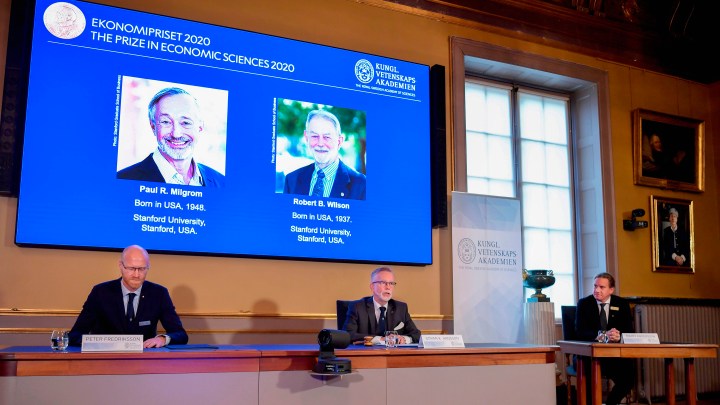
U.S. economists win Nobel Prize for auction theory work

The 2020 Nobel Memorial Prize in Economic Sciences has been awarded to Paul R. Milgrom and Robert B. Wilson “for improvements to auction theory and inventions of new auction formats.”
Marketplace senior economics contributor Chris Farrell joined “Marketplace Morning Report” host Sabri Ben-Achour to discuss the role of auction theory in the real world. The following is an edited transcript of their conversation.
Sabri Ben-Achour: OK, so, auction theory. I mean, I think I know what an auction is. But what is auction theory and how did they improve it?
Chris Farrell: What Wilson’s contribution was is that he showed how rational bidders — if you think about, you know, companies and CFOs, and the CEOs, I mean, they’re rational bidders — they tended to place bids that were below their own estimate of common value. And the reason was this fear about the “winner’s curse,” that they were going to over pay.
And then professor Milgrom, he’s behind a much more general theory of auctions that allowed for calculating common values and private values that vary from bidder to bidder. And what they were able to do was design auctions that allowed for multiple bids over a period of time.
Ben-Achour: How has that played out in the real world? What have been the practical implications?
Farrell: Well, there’s an article by Paul Milgrom in The Hill, from 2017. And in it he says that [the first FCC spectrum auction], collectively, was the greatest auction in history, delivering more than $60 billion for the federal government since the early 1990s. These auctions of radio frequencies to telecom operators and other auctions really have been critical to creating this robust wireless communications network that we enjoy today.
There’s a lot happening in the world. Through it all, Marketplace is here for you.
You rely on Marketplace to break down the world’s events and tell you how it affects you in a fact-based, approachable way. We rely on your financial support to keep making that possible.
Your donation today powers the independent journalism that you rely on. For just $5/month, you can help sustain Marketplace so we can keep reporting on the things that matter to you.











